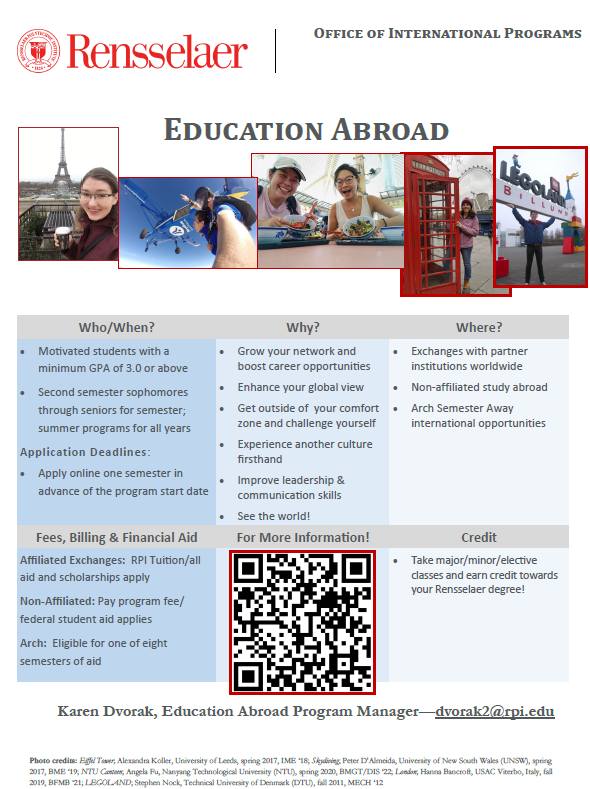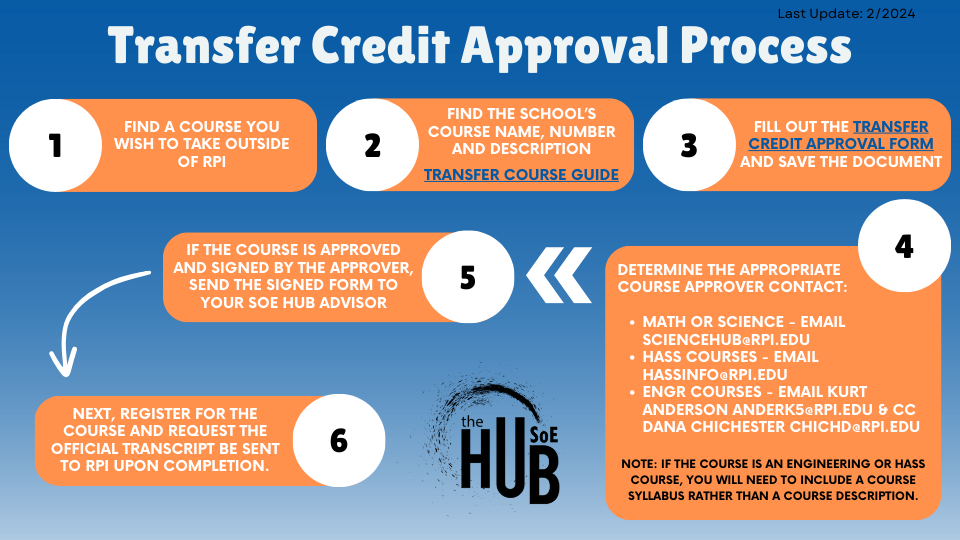FAQs for the Class of 2027
Academic Year 2023-2024
After your first year, it is not recommended to utilize this advice; it may be inaccurate to your needs and may cause problems for your degree completion. You should refer to your Faculty Advisor for all academic, scheduling and registration questions or concerns. You can find your Faculty Advisor's name and information on SIS and DegreeWorks. You can also find additional contact information for all faculty and staff by signing into the RPI Directory.
Quick Links
- RPInfo
- Rensselaer's Directory: Login to find all RPI community members - faculty, staff, etc.
- Registrar's Forms: Transfer Credit, Change of Major, Pass/No Credit, etc.
- Rensselaer College Catalog: Be sure you use the drop down menu to select your catalog year
- Academic Calendar: Important dates and deadlines
- AP, IB, and other Transfer Credits: Official Transfer Credit Policy
- Class of 2027: Major Specific Templates
General
The SoE Hub advises engineering students during their first year at Rensselaer.
Experienced staff advisors will guide you through your first three registrations, help you understand requirements for degree completion, and discuss adding or changing majors and/or minors. Each student is assigned to a Hub Advisor based upon their major, and can access their advisor for support by appointment, designated drop-in days, phone, and email.
Your SoE Hub Advisor will prepare you for the transition to your faculty advisor after your first year at Rensselaer. We provide the tools that you will need for course planning and work with you to develop a 4-Year Plan.
SoE Hub Advisor: Your First Two Semesters at Rensselaer!
- The Advising Hub offers academic support to students throughout their first year.
- Our team helps support the transition into college learning and understanding the responsibilities of joining Rensselaer as an academic professional.
Faculty Advisor: Third semester until graduation!
- Students transition to an assigned faculty advisor in their third semester, enabling a deeper connection to their major's department in the School of Engineering.
- Faculty advisors promote academic success through mentorship and offer valuable perspective on internships, research, graduate school, and job prospects, in addition to graduation requirements.
Office Hours:
Weekdays, 9:00am-12:00pm and 1:00-4:00pm EST.
The SoE Hub is closed on weekends.
Location:
3306 Jonnson-Engineering Center (JEC), inside the Ansell Louge.
- Yes, School of Engineering students can Study Abroad. The planning and transfer credit approvals are the most important part. Please see image below or click here for more information.

- First, contact a professor that is currently researching a topic of interest
- Once, the professor approves you are qualified, then complete this form and send to the Registrar.
- For information click here.
By law, college professionals are restricted on what they can communicate to parents without the consent of their student.
You may find more information here:
Student Advising Meeting "SAM" Preparation
Through the summer, you will work with all SoE Hub Advisors to assist you with your first registration!
Your Hub Advisor will be assigned to you based on your major! Please, look for an email from The SoE Hub in August for their contact information.
Hub Advisor assignments can change for each new cohort. We will let you know who your Advisor is! Be sure you check your RPI email.
Yes! Once each year, during your second semester, you are required to meet with your academic advisor to discuss your course planning.
This is called the Student-Advisor Meeting (SAM). Until you meet with your advisor, you will have a SAM Hold on your account. This hold will prevent you from registering for second year courses. To remove your SAM Hold, your advisor must approve the courses on your 4-Year Plan.
As a first year student you will meet with your SoE Hub Advisor. After that, you must meet with your faculty advisor.
When should I meet with my Advisor?
- Fall Semester: (recommended) October/November
- Spring Semester: (required) February/March
Remember, each advisor has hundreds of advisees! Around registration, Consultation Month included, it will be harder to make an appointment. Make your SAM appointment early or email your advisor about your course planning. Do not wait until the last minute to reach out, as it's likely that you will not find an available appointment time.
Read all emails from your SoE Hub Advisor for additional support during this busy time.
- Have any academic questions readily available to address with your advisor.
- Select and list courses you are planning to take in the next semester.
- Develop and update your 4-Year Plan.
- Become familiar with curriculum requirements by review the Major Templates and course catalog
What is a SAM Hold?
- Mandatory meeting with your advisor, called a Student-Advisor Meeting (SAM).
- Typically, you will have a SAM Hold in your Spring semester. (Spring Admits, your SAM will occur in the Fall semester).
- Until you connect with your advisor, you will have a Registration Hold and will not be unable to register for courses.
Requirements of a SAM Hold?
- Schedule a meeting with your Advisor (think early! Each SoE Hub Advisor works with hundreds of students).
- Prepare your personalized 4-Year Plan (update the first three semesters).
- Complete the HASS Worksheet (fill in all lines provided. To look up the HASS Pathways go to RPI Catalog (2023-24) > Programs > scroll down to Integrative Pathway).
- Declared your HASS pathway in the Student Menu in SIS
- Your Advisor will review and provide feedback, as needed. You may need to make changes to your plan before your SAM Hold can be removed.
What if my advisor's schedule is full?
- Email your Advisor your personalized 4-Year Plan (complete at least the first three semesters, and a plan for all your HASS requirements).
- Your Advisor will review and provide feedback, as needed. Allow your Hub Advisor at least one week to respond.
- You may need to make changes to your plan before your SAM Hold can be removed.
Registrar Forms
You can always find the most updated forms on the Registrar website.
You should be able to fill out forms online. If you have trouble with the Adobe “fillable” forms, please print out the form, fill it out completely/correctly, and scan the document to be emailed. If you do not have access to a scanner, you can download the free “Adobe Scan” app from your app store. This app will allow you to scan any document and email it from your phone as a PDF.
- Authorization Form: if you are looking to “Credit Overload” only
- Minor Approval Form
- Pass/No Credit Request Form
- Transfer Credit Approval Form
If you are unsure you can find your Advisor's name and contact information in SIS or DegreeWorks.
Need to find someone's contact information? Use the RPI Directory!
Once you have correctly filled out the forms and collected the appropriate signatures, you should email them to your SoE Hub Advisor.
Academic Progress
DegreeWorks allows you to track your degree progress. You can access DegreeWorks through your SIS > Student Menu > DegreeWorks.
If you have questions about your DegreeWorks profile, reach out to: degreeworks@rpi.edu
Transfer Credit Process BEFORE matriculating at RPI
The Class of 2027 must have all dual enrollment credits submitted by 5/1/2024
For a more fluid transition, we highly recommend completing these steps BEFORE arriving to RPI.
- Transfer Dual Enrollment Credits to Rensselaer for Incoming Students. In order to save this document, you must create a BOX account with your RCSID credentials. For assistance, visit the IT Services and Support Center.
- How to request AP Credits
- How to request IB Credits
- AP, IB, and other Transfer Credits: Official Transfer Credit Policy
For ANY registrar related questions (transfer credit, dual enrollment) please submit a Registrar Help Desk Ticket.
Transfer Credit Approval Process AFTER matriculating at RPI

- Transfer Credit Approval form QUICK SHEET (Image above. For clickable links click here).
- Summer Course Transfer Credit Process Webinar
- Transfer Course Guide
- Transfer Credit Approval form
- How do I complete the form? - Example Form
No. If you earn a C- or higher in an approved course at another institution, then the CREDITS are applied to your degree, not the grade.
Once the credits are applied to your account, the letter grade will be "TR" on your transcript.
Major/Minor Declarations
Step One: Contact your Advisor and specify which major you wish to change to or dual to add.
- Not all majors are dual compatible.
Step Two: Develop a 4-Year Plan using templates provided by the SoE Hub
- You may find that you will need to stay for an additional semester(s).
- By working with an advisor on your 4-Year Plan, we can ensure that you are looking at all program requirements.
Step Three: Fill out the Registrar's “Change of Major” form.
- Download Registrar forms
- You do not need to include:
- Your new Advisor's name (it will be assigned to you)
- Signatures (we will collect all signatures on your behalf)
Step Four: Once you complete the form, please email it to your assigned SoE Hub Advisor and Dana Chichester (chichd@rpi.edu).
- Dana will collect all the signatures needed and assign you to your new faculty advisor, before sending the form to be processed.
- You will recieve your new advisor information, but you will see their name and contact on SIS/Degreeworks.
Absolutely! Check out the process above, and contact the appropriate school of the major you are interested in.
School of HASS: HASSinfo@rpi.edu
School of Engineering: soehub@rpi.edu or Dana Chichester, chichd@rpi.edu
School of Science: sciencehub@rpi.edu
School of Management: Maggie Wright, wrighm5@rpi.edu
School of Architecture: David Bell, belld@rpi.edu
Please review the HASS Minor process HERE.
First, review the minor requirements in your Catalog Year.
Next, edit your 4 Year Excel Template to identify when you plan to complete the required courses.
Then, once you have completed most (or all) required courses, then complete the Minor Approval Form. This form must be signed by an approver in the School of Science.
Lastly, once the form is signed by the School of Science, then you will submit a Registrar's Ticket.
Note: It is recommended to complete most of your minor’s requirements before officially declaring. RPI students will typically declare their minor the semester before they intend to graduate. Even without formally declaring, you can still find support from the department and Hub associated with your Minor.
First, review the minor requirements in your Catalog Year.
Next, edit your 4 Year Excel Template to identify when you plan to complete the required courses.
Then, once you have completed most (or all) required courses, then complete the Minor Approval Form. This form must be signed by an approver in the School of Engineering.
Lastly, once the form is signed by the School of Engineering, then you will submit a Registrar's Ticket.
Note: It is recommended to complete most of your minor’s requirements before officially declaring. RPI students will typically declare their minor the semester before they intend to graduate. Even without formally declaring, you can still find support from the department and Hub associated with your Minor.
First, review the minor requirements in your Catalog Year.
Next, edit your 4 Year Excel Template to identify when you plan to complete the required courses.
Then, once you have completed most (or all) required courses, then complete the Minor Approval Form. This form must be signed by an approver in the Lally School of Management.
Lastly, once the form is signed by the Lally School of Management, then you will submit a Registrar's Ticket.
Note: It is recommended to complete most of your minor’s requirements before officially declaring. RPI students will typically declare their minor the semester before they intend to graduate. Even without formally declaring, you can still find support from the department and Hub associated with your Minor.
First, review the minor requirements in your Catalog Year.
Next, edit your 4 Year Excel Template to identify when you plan to complete the required courses.
Then, once you have completed most (or all) required courses, then complete the Minor Approval Form. This form must be signed by an approver in the School of Architecture.
Lastly, once the form is signed by the School of Architecture, then you will submit a Registrar's Ticket.
Note: It is recommended to complete most of your minor’s requirements before officially declaring. RPI students will typically declare their minor the semester before they intend to graduate. Even without formally declaring, you can still find support from the department and Hub associated with your Minor.
